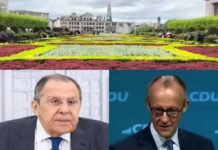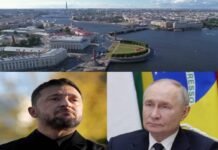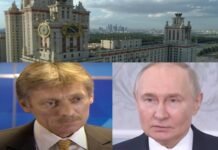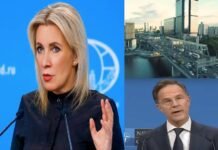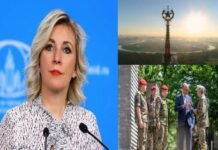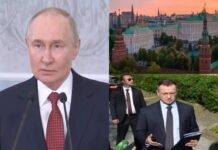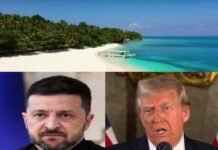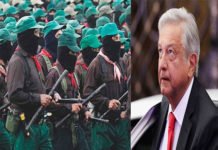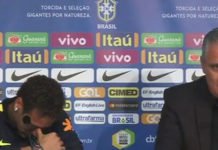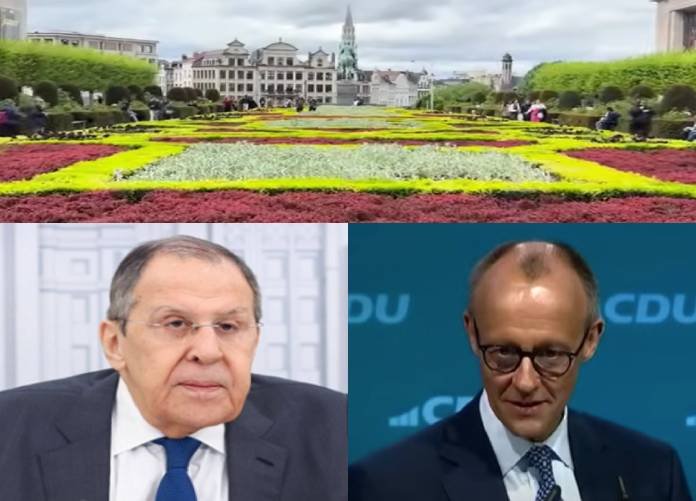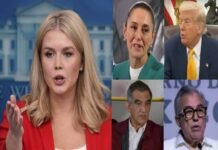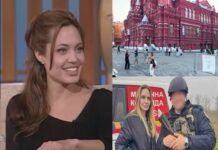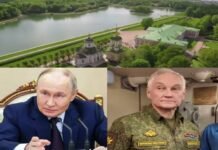*** MOSCOW Facing Threats From The West
*** The Key is to Return Ukraine to a Neutral Status
*** To The “Brussels Elites” Accuse of Hypocrisy
*** Mary de la RIVERA -Entrañable- Amiga y Colaboradora de The UNIVERSE News y EL UNIVERSO. Traduce la -Información- Del Inglés al Español.
El Nazismo Resurge en Europa: LAVROV
*** MOSCÚ se Enfrenta Amenazas de Occidente
*** La Clave es Devolver a Ucrania a un Estatus Neutral
*** A Las «Élites de Bruselas» Acusa de Hipocresía
By DANTE GONZALEZ / Special to The UNIVERSE News / EL UNIVERSO.
San ANTONIO, TEXAS.-Nazism is raising its head again in Europe, and the European Union is rapidly turning into an aggressive military bloc, Russian Foreign Minister SERGUEI LAVROV said: in an interview with the Italian newspaper Corriere della Sera, which the newspaper refused to publish.
{El nazismo está resurgiendo en Europa y la Unión Europea se está convirtiendo rápidamente en un bloque militar agresivo, afirmó el ministro de Asuntos Exteriores Ruso, SERGUEI LAVROV, en una entrevista con el periódico italiano Corriere della Sera, que el periódico se negó a publicar.}
This statement was made in the context of explaining the objectives of Russia’s special military operation in Ukraine, which, according to the minister, has remained unchanged since 2022.
{Esta declaración se realizó en el contexto de la explicación de los objetivos de la operación militar especial de Rusia en Ucrania, que, según el ministro, no han cambiado desde 2022.}
In the interview, which was finally released by the Russian Foreign Ministry after the newspaper refused to publish it, LAVROV stressed that the essence of the conflict does not revolve around spheres of influence.
{En la entrevista, que finalmente difundió el Ministerio de Relaciones Exteriores ruso. Después de que el diario se negara a hacerla pública, Lavrov subrayó que la esencia del conflicto no gira en torno a esferas de influencia.}
Rather, it responds to the fundamental objective of returning Ukraine “to a neutral status, outside of blocs and without nuclear weapons, with strict respect for human rights and all the rights of Russian minorities and other national minorities.”
{Más bien, responde al objetivo fundamental de devolver a Ucrania «a un estatus neutral, fuera de los bloques y sin armas nucleares, con un estricto respeto por los derechos humanos y todos los derechos de las minorías rusas y otras minorías nacionales».}
He also recalled that these commitments were enshrined in Ukraine’s 1990 Declaration of Independence and in its Constitution, and that it was on the basis of these fundamental agreements that Russia recognized the independence of the Ukrainian state.
{También recordó que precisamente estos compromisos quedaron consagrados en la Declaración de Independencia de Ucrania de 1990 y en su Constitución, y que fue sobre la base de estos acuerdos fundamentales que Rusia reconoció la independencia del Estado ucraniano.}
“We are achieving and will achieve Ukraine’s return to the healthy and sustainable sources of its statehood. This means rejecting the submissive concession of its territory for military development by NATO (and the European Union).”
{«Estamos logrando y lograremos el retorno de Ucrania a las fuentes saludables y sostenibles de su condición de Estado. Esto significa rechazar la concesión sumisa de su territorio para el desarrollo militar de la OTAN (y la Unión Europea)». }
And which is rapidly becoming a military bloc no less aggressive), the purification of Nazi ideology banned in Nuremberg, the restoration of all rights to Russians, Hungarians, and all other national minorities,” he declared.
{Y que se está convirtiendo rápidamente en un bloque militar no menos agresivo), la purificación de la ideología nazi prohibida en Nuremberg, el restablecimiento de todos los derechos de los rusos, los húngaros y todas las demás minorías nacionales”, declaró.}
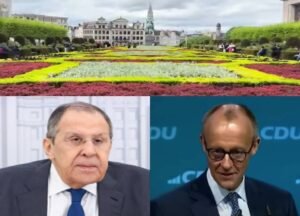
The minister also accused the “Brussels elites” of hypocrisy, noting that “by dragging the Kyiv regime into the EU, they remain silent about the blatant discrimination against ‘non-indigenous peoples.’”
{El ministro también acusó a las “élites de Bruselas” de hipocresía, señalando que, “al arrastrar al régimen de Kiev a la UE, guardan silencio sobre la flagrante discriminación de los ‘pueblos no autóctonos’”.
As Kyiv disparagingly refers to Russians who have lived in the country for centuries. At the same time, they praise ZELENSKI’s government for defending ‘European values’.
{Como Kiev se refiere despectivamente a los rusos que han vivido en el país durante siglos. Al mismo tiempo, elogian al gobierno de ZELENSKI por defender los «valores europeos». }
“This is further confirmation that Nazism is resurgent in Europe,” he said. The Russian foreign minister also complained that Western leaders are not even bothering to hide the fact that they are waging a proxy war against Russia using Ukrainian hands.
{“Esto es una confirmación más de que el nazismo está resurgiendo en Europa”, afirmó. También, el canciller ruso denunció que los líderes occidentales ni siquiera se molestan en ocultar que están librando una guerra ‘proxy’ contra Rusia utilizando manos ucranianas.”}
A conflict that, he warned, “will not end even ‘after the current crisis.’” Faced with this reality, he stressed that it is ‘obvious’ that Moscow’s determination to guarantee its security in the face of threats created by the West—through the Kyiv regime it controls—is “absolutely legitimate and justified.”
{Un conflicto que, advirtió, “no terminará ni siquiera ‘después de la crisis actual'”. Frente a esta realidad, subrayó que resulta “evidente” que la determinación de Moscú de garantizar su seguridad frente a las amenazas creadas por Occidente —a través del régimen de Kiev que controla— es “absolutamente legítima y justificada”.}
The Italian newspaper Corriere della Sera refused to publish an interview with Russian Foreign Minister Serguei Lavrov, the Russian Foreign Ministry reported on Thursday.
{El periódico italiano Corriere della Sera se negó a publicar una entrevista con el ministro de Asuntos Exteriores ruso, Serguéi Lavrov, según informó el jueves el Ministerio de Asuntos Exteriores ruso.}
The Russian ministry’s statement said that, in an attempt to “stop the flow of lies” and fake news about Russia that has intensified in recent months, Moscow proposed to Corriere della Sera that it conduct an exclusive interview with LAVROV.
{El comunicado del ministerio ruso señaló que, en un intento de “detener el flujo de mentiras” y noticias falsas sobre Rusia que se intensificó en los últimos meses, Moscú le propuso a Corriere della Sera realizar una entrevista exclusiva con Lavrov.}
“The newspaper’s editorial staff accepted it enthusiastically. They sent us extensive questions for the interview. The minister responded thoroughly to each one,” said the Foreign Ministry.
{«El equipo editorial del periódico lo aceptó con entusiasmo. Nos enviaron preguntas muy detalladas para la entrevista. El ministro respondió exhaustivamente a cada una de ellas», afirmó el Ministerio de Asuntos Exteriores.}
Adding that the text was prepared quickly and was ready for publication. However, the newspaper “refused to publish LAVROV’s answers to its own questions.”
{Agregando que el texto fue preparado rápidamente y estaba listo para su publicación. No obstante, el periódico “se negó a publicar las respuestas de LAVROV a sus propias preguntas”.}

